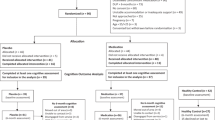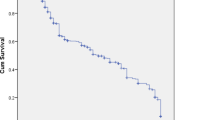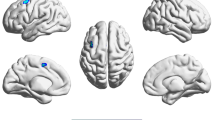Abstract
Although previous studies report cognitive improvement following atypical antipsychotic administration in schizophrenia (SC), few placebo-controlled within-subject studies with examination of confounds (symptom reduction, cooperation, learning, and outliers) have been reported. The present study examines the effects of atypicals and confounds upon cognition in SC. The hypothesis tested was that relative to placebo, atypicals as a general class of medication would elicit cognitive improvement in SC. In all, 19 patients with SC (15 males) completed the double-blind, counterbalanced, randomized within-subject study of the effects of atypical antipsychotics (risperidone, clozapine, olanzapine, or quetiapine) vs placebo administration upon cognitive performance in the domains of executive function, attention, memory, language, visual perception, and general intellect. Significant cognitive improvement during atypical antipsychotic administration relative to placebo withdrawal occurred in most cognitive domains with robust improvements in intelligence (p=0.001), memory (p=0.0009), and fluency (p<0.002) even after outliers and unmotivated performances were excluded. These findings suggest that relative to placebo withdrawal, atypicals improve cognitive performance in SC. However, this finding may not be specific to atypicals, since analogous studies of typicals have not been performed.
Similar content being viewed by others
Log in or create a free account to read this content
Gain free access to this article, as well as selected content from this journal and more on nature.com
or
References
Benton AL, Hamsher KD, Varney NR, Spreen O (1983). Contributions to Neuropsychological Assessment. Oxford: New York.
Bilder RM, Goldman RS, Volavka J, Czobor P, Hoptman M, Sheitman B et al (2002). Neurocognitive effects of clozapine, olanzapine, risperidone, and haloperidol in patients with chronic schizophrenia or schizoaffective disorder. Am J Psychiatry 159: 1018–1028.
Buchanan RW, Holstein C, Breier A (1994). The comparative efficacy and long-term effect of clozapine treatment on neuropsychological test performance. Biol Psychiatry 36: 717–725.
Callicott JH, Mattay VS, Bertolino A, Finn K, Coppola R, Frank JA et al (1999). Physiological characteristics of capacity constraints in working memory as revealed by functional MRI. Cereb Cortex 9: 20–26.
Carpenter WT, Gold JM (2002). Another view of therapy for cognition in schizophrenia. Biol Psychiatry 51: 969–971.
Carpenter WT, Gold JM (2003). Reply to: atypical antipsychotic drugs improve cognition in schizophrenia. Biol Psychiatry 53: 267–268.
Cole JO, Klerman GL, Goldberg SC, Clyde DJ, Davidson EM, Kayce MM et al (1964). Phenothiazine treatment in acute schizophrenia. Arch Gen Psychiatry 10: 246–261.
Cuesta MJ, Peralta V (1995). Psychopathological dimensions in schizophrenia. Schizophr Bull 21: 473–482.
Davis JM, Chen N (2001). The effects of olanzapine on the 5 dimensions of schizophrenia derived by factor analysis: combined results of the North American and international trials. J Clin Psychiatry 62: 757–771.
Davis JM, Chen N (2002). Clinical profile of an atypical antipsychotic: risperidone. Schizophr Bull 28: 43–61.
Delis DC, Kramer JH, Kaplan E, Ober BA (1987). California Verbal Learning Test Manual. Psychological Corp.: New York.
Dollfus S, Petit M, Lesieur P, Menard J (1991). Principal-component analysis of PANSS and SANS-SAPS global ratings in schizophrenic patients. Eur Psychiatry 6: 251–259.
Farde L, Wiesel FA, Nordstrom AL, Sedvall G (1989). D1- and D2-dopamine receptor occupancy during treatment with conventional and atypical neuroleptics. Psychopharmacology (Berl) 99(Suppl): S28–S31.
Fujii DE, Ahmed I, Jokumsen M, Compton JM (1997). The effects of clozapine on cognitive functioning in treatment-resistant schizophrenic patients. J Neuropsychiatry Clin Neurosci 9: 240–245.
Galletly CA, Clark CR, McFarlane AC, Weber DL (1997). Relationships between changes in symptom ratings, neurophysiological test performance and quality of life in schizophrenic patients treated with clozapine. Psychiatry Res 72: 161–166.
Gallhofer B, Bauer U, Lis S, Krieger S, Gruppe H (1996). Cognitive dysfunction in schizophrenia: comparison of treatment with atypical antipsychotic agents and conventional neuroleptic drugs. Eur Neuropsychopharmacol 6(Suppl 2): S13–S20.
Geddes J, Freemantle N, Harrison P, Bebbington P (2000). Atypical antipsychotics in the treatment of schizophrenia: systematic overview and meta-regression analysis. BMJ 321: 1371–1376.
Goldberg TE, Egan MF, Gscheidle T, Coppola R, Weickert T, Kolachana BS et al (in press). Executive subprocesses in Working Memory: Relationships with COMT Val108/158 Met genotype and genetic risk for Schizophrenia. Arch Gen Psychiatry.
Goldberg TE, Weinberger DR (1996). Effects of neuroleptic medications on the cognition of patients with schizophrenia: a review of recent studies. J Clin Psychiatry 57(Suppl 9): 62–65.
Gordon M (1987). Instruction Manual for the Gordon Diagnostic System. Gordon Systems: DeWitt, NY.
Gordon M, McClure FD, Aylward GP (1996). The Gordon Diagnostic System Interpretive Guide, 3rd edn GSI Publications: DeWitt, NY.
Green MF, Marshall Jr BD, Wirshing WC, Ames D, Marder SR, McGurk S et al (1997). Does risperidone improve verbal working memory in treatment-resistant schizophrenia? Am J Psychiatry 154: 799–804.
Hagger C, Buckley P, Kenny JT, Friedman L, Ubogy D, Meltzer HY (1993). Improvement in cognitive functions and psychiatric symptoms in treatment-refractory schizophrenic patients receiving clozapine. Biol Psychiatry 34: 702–712.
Heaton RK, Chelune GJ, Talley JL, Kay GG, Curtiss G (1993). Wisconsin Card Sorting Test Manual: Revised and Expanded. Psychological Assessment Resources: Odessa, FL.
Hoff AL, Faustman WO, Wieneke M, Espinoza S, Costa M, Wolkowitz O et al (1996). The effects of clozapine on symptom reduction, neurocognitive function, and clinical management in treatment-refractory state hospital schizophrenic inpatients. Neuropsychopharmacology 15: 361–369.
Jastak S, Wilkinson GS (1984). The Wide Range Achievement Test-Revised Administration Manual. Jastak Associates: Wilmington.
Kaufman AS (1990). Assessing Adolescent and Adult Intelligence. Allyn and Bacon: Needham, MA.
Kay SR, Fiszbein A, Opler LA (1987). The positive and negative syndrome scale (PANSS) for schizophrenia. Schizophr Bull 13: 261–276.
Keefe RS, Silva SG, Perkins DO, Lieberman JA (1999). The effects of atypical antipsychotic drugs on neurocognitive impairment in schizophrenia: a review and meta-analysis. Schizophr Bull 25: 201–222.
Kern RS, Green MF, Marshall Jr BD, Wirshing WC, Wirshing D, McGurk SR et al (1999). Risperidone versus haloperidol on secondary memory: can newer medications aid learning? Schizophr Bull 25: 223–232.
Knights RM, Ivan LP, Ventureyra EC, Bentivoglio C, Stoddart C, Winogron W et al (1991). The effects of head injury in children on neuropsychological and behavioural functioning. Brain Injury 5: 339–351.
Lee MA, Thompson PA, Meltzer HY (1994). Effects of clozapine on cognitive function in schizophrenia. J Clin Psychiatry 55(Suppl B): 82–87.
Mandleberg IA, Brooks DN (1975). Cognitive recovery after severe head injury. 1. Serial testing on the Wechsler Adult Intelligence Scale. J Neurol Neurosurg Psychiatry 38: 1121–1126.
Mayes SD, Pelco LE, Campbell CJ (1989). Relationships among pre- and post-injury intelligence, length of coma and age in individuals with severe closed-head injuries. Brain Injury 3: 301–313.
McGurk S, Green M, Wirshing W, Ames D, Marshall BJ, Marder A et al (1997). The effects of risperidone vs haloperidol on cognitive functioning in treatment resistant schizophrenia: The Trail Making Test. CNS Spectrums 2: 60–64.
Meltzer HY (1989). Clinical studies on the mechanism of action of clozapine: the dopamine-serotonin hypothesis of schizophrenia. Psychopharmacology (Berl) 99(Suppl): S18–S27.
Meltzer HY (1992). Dimensions of outcome with clozapine. Br J Psychiatry 160(Suppl 17): 46–53.
Meltzer HY, Bastani B, Ramirez L, Matsubara S (1989a). Clozapine: new research on efficacy and mechanism of action. Eur Arch Psychiatry Neurol Sci 238: 332–339.
Meltzer HY, Matsubara S, Lee JC (1989b). Classification of typical and atypical antipsychotic drugs on the basis of dopamine D-1, D-2 and serotonin2 pKi values. J Pharmacol Exp Ther 251: 238–246.
Meltzer HY, Matsubara S, Lee JC (1989c). The ratios of serotonin2 and dopamine2 affinities differentiate atypical and typical antipsychotic drugs. Psychopharmacol Bull 25: 390–392.
Meltzer HY, McGurk SR (1999). The effects of clozapine, risperidone, and olanzapine on cognitive function in schizophrenia. Schizophr Bull 25: 233–255.
Meyer-Lindenberg A, Gruppe H, Bauer U, Lis S, Krieger S, Gallhofer B (1997). Improvement of cognitive function in schizophrenic patients receiving clozapine or zotepine: results from a double-blind study. Pharmacopsychiatry 30: 35–42.
Missar CD, Gold JM, Goldberg TE (1994). WAIS-R short forms in chronic schizophrenia. Schizophr Res 12: 247–250.
Palmer B, Heaton R, Paulsen J, Kuck J, Braff D, Harris M et al (1997). Is it possible to be schizophrenic yet neuropsychologically normal? Neuropsychology 11: 437–446.
Potkin SG, Fleming K, Jin Y, Gulasekaram B (2001). Clozapine enhances neurocognition and clinical symptomatology more than standard neuroleptics. J Clin Psychopharmacol 21: 479–483.
Purdon SE, Labelle A, Boulay L (2001). Neuropsychological change in schizophrenia after 6 weeks of clozapine. Schizophr Res 48: 57–67.
Reitan RM (1986). Trail-Making Test Manual for Administration and Scoring. Reitan Neuropsychology Laboratory: Tucson, AZ.
Richelson E (1984). Neuroleptic affinities for human brain receptors and their use in predicting adverse effects. J Clin Psychiatry 45: 331–336.
Rossi A, Mancini F, Stratta P, Mattei P, Gismondi R, Pozzi F et al (1997). Risperidone, negative symptoms and cognitive deficit in schizophrenia: an open study. Acta Psychiatr Scand 95: 40–43.
Seeman P (1987). Dopamine receptors and the dopamine hypothesis of schizophrenia. Synapse 1: 133–152.
Serper M, Chou J (1997). Novel improve attentional functioning in schizophrenic patients: ziprasidone and aripiprazole. CNS Spectrums 2: 56–59.
Spreen O, Strauss E (1991). A Compendium of Neuropsychological Tests. Oxford: New York.
Stip E, Lussier I (1996). The effect of risperidone on cognition in patients with schizophrenia. Can J Psychiatry 41(8 Suppl 2): S35–S40.
Wechsler D (1981). Wechsler Adult Intelligence Scale-Revised Manual. The Psychological Corp.: San Antonio.
Wechsler D (1987). Wechsler Memory Scale-Revised Manual. Psychological Corp: New York.
Weickert TW, Goldberg TE, Gold JM, Bigelow LB, Egan MF, Weinberger DR (2000). Cognitive impairments in patients with schizophrenia displaying preserved and compromised intellect. Arch Gen Psychiatry 57: 907–913.
White PD, Lishman WA, Wyke MA (1986). Phaeochromocytoma as a cause of reversible dementia. J Neurol Neurosurg Psychiatry 49: 1449–1451.
Zahn TP, Pickar D, Haier RJ (1994). Effects of clozapine, fluphenazine, and placebo on reaction time measures of attention and sensory dominance in schizophrenia. Schizophr Res 13: 133–144.
Acknowledgements
This paper was presented in part at the 39th Annual meeting of the American College of Neuropsychopharmacology, December 2000.
Author information
Authors and Affiliations
Corresponding author
Rights and permissions
About this article
Cite this article
Weickert, T., Goldberg, T., Marenco, S. et al. Comparison of Cognitive Performances During a Placebo Period and an Atypical Antipsychotic Treatment Period in Schizophrenia: Critical Examination of Confounds. Neuropsychopharmacol 28, 1491–1500 (2003). https://doi.org/10.1038/sj.npp.1300216
Received:
Revised:
Accepted:
Published:
Issue date:
DOI: https://doi.org/10.1038/sj.npp.1300216
Keywords
This article is cited by
-
A systematic review of the effects of psychiatric medications on social cognition
BMC Psychiatry (2021)
-
The relationship between dopamine receptor blockade and cognitive performance in schizophrenia: a [11C]-raclopride PET study with aripiprazole
Translational Psychiatry (2018)
-
Lack of association between dopaminergic antagonism and negative symptoms in schizophrenia: a positron emission tomography dopamine D2/3 receptor occupancy study
Psychopharmacology (2016)
-
Antipsychotics and Amotivation
Neuropsychopharmacology (2015)
-
The switch from conventional to atypical antipsychotic treatment should not be based exclusively on the presence of cognitive deficits. A pilot study in individuals with schizophrenia
BMC Psychiatry (2010)



